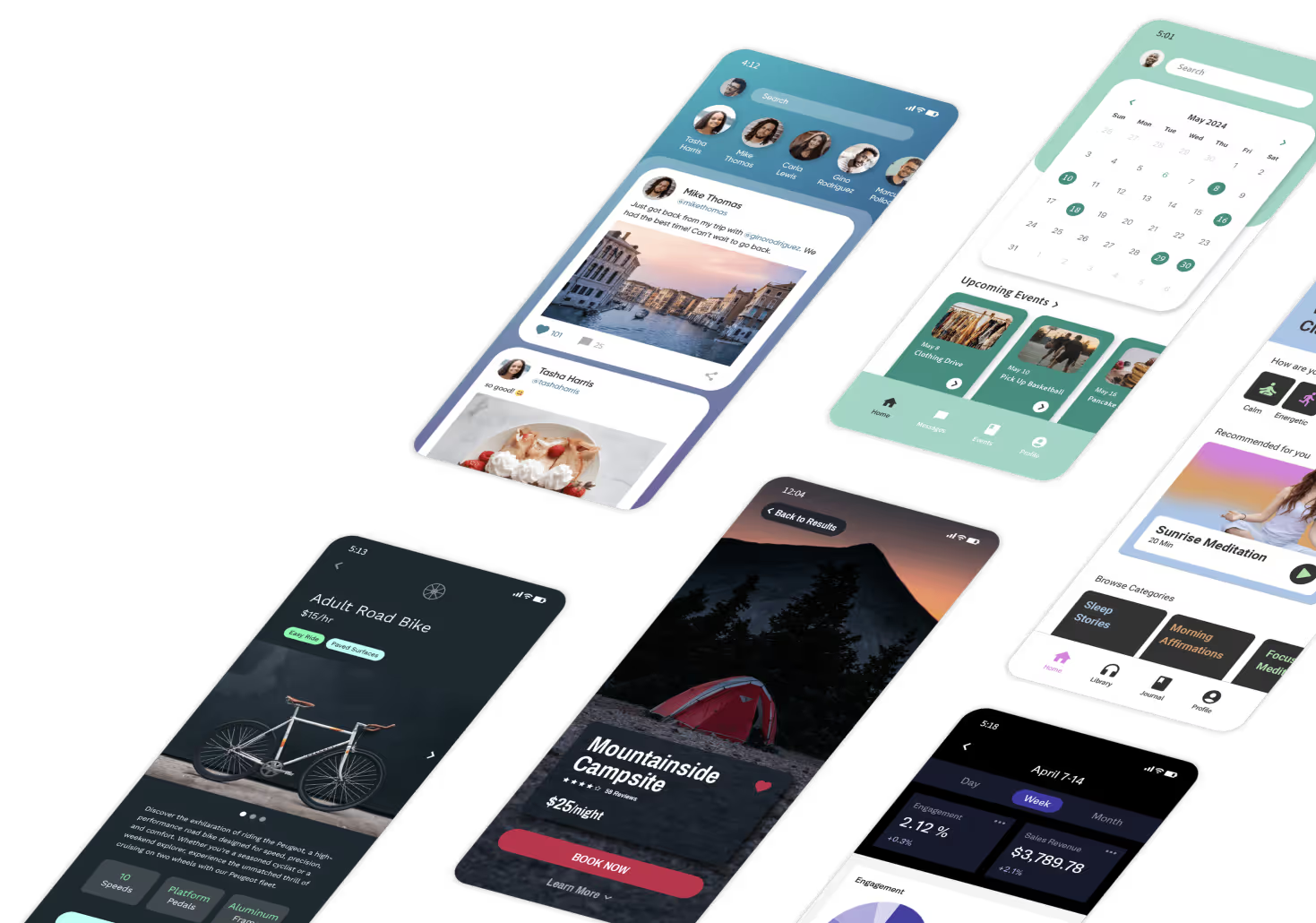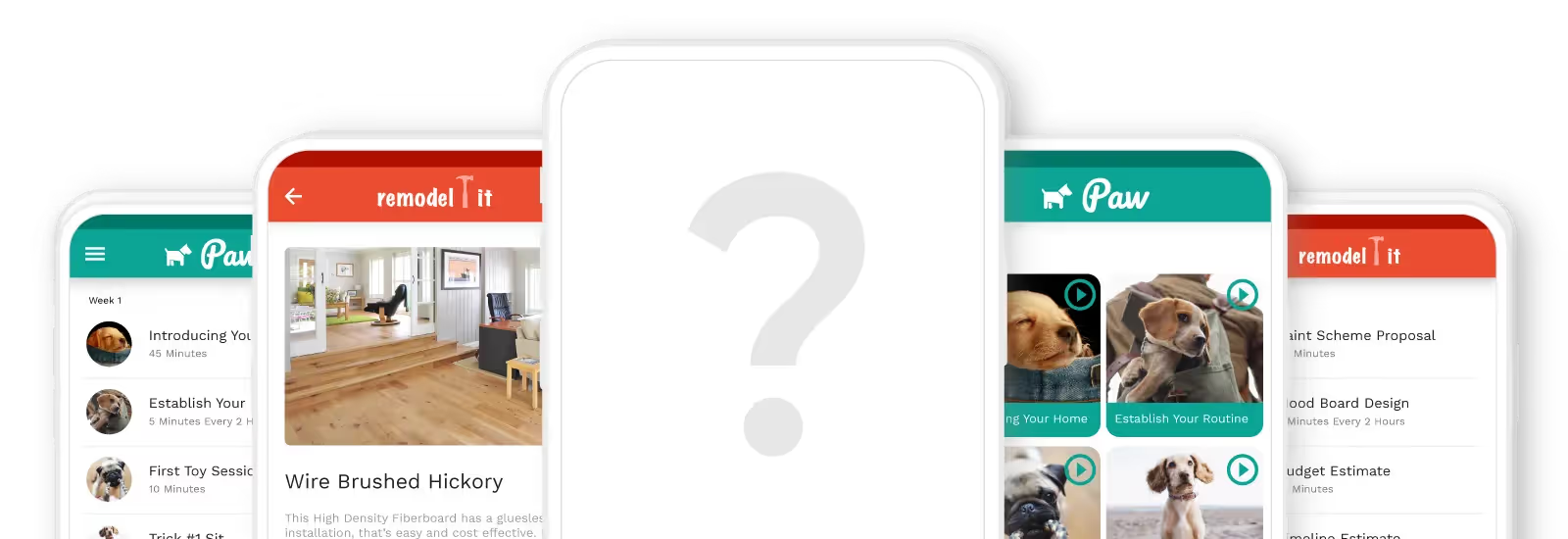Real estate professionals often dream of having a custom app that meets their exact needs. But the thought of sky-high development costs and complicated coding can be intimidating.
The good news? You can skip the generic solutions and hefty costs while still getting a professional-quality app.
With the right real estate app builder, you can create your feature-rich app — no coding required and at a fraction of the cost.
In this guide, we’ll review the top 5 real estate app builders for 2024, highlighting key features like customization, branding options, and ease of use.
5 Best Real Estate App Builders
- Adalo is the best overall real estate app builder
- Jotform is a fast real estate app builder
- Homestack is a simple real estate app builder
- Glide is for building a gorgeous real estate app
- Bravo Studio is the best real estate app builder for designers

What Is a Real Estate App Builder?
There are quite a few app-building platforms out there, but in real estate application development, an app-building platform must have the following real estate-centric features:
- 100% no-code: All these app builders share a key benefit — no technical or coding knowledge is required.
Each app builder leverages a no-code interface that lets you build your app by stacking digital blocks together, pointing and clicking to add new features, and dragging and dropping elements on an app-building canvas.
- Add listings and book appointments: Some of the key features all real estate apps need are listing for-sale or for-rent properties and enough pictures to show potential clients exactly what each property offers.
Clients will be able to browse through your listings and book appointments to see the properties for themselves.
- Integrations: Real estate is an enormous industry, so you’ll want to show your listings on as many platforms as possible. I ensured that you can connect your real estate app's listings with third-party platforms like Zillow, Trulia, Redfin, and others.
You’ll also be able to plug in third-party tools to help with real estate management tasks, like integration with Stripe, Square, or PayPal for taking rent payments or messaging features to communicate directly with tenants or clients in one easy-to-reach place.
- White-label branding: One of the main drawbacks of real estate management software is that you can’t brand your app. The real estate app builders on this list all support customized, white-label branding to ensure that your app distinctly belongs to your company, not some third-party SaaS platform.
#1 Adalo: Best Overall Real Estate App Builder

Adalo is an easy-to-use, no-code native mobile app builder that packs enough punch and customization features to breathe life into any real estate app idea.
Why Do I Like It?
Adalo is the best out of all the real estate app builders on this list because of its perfect balance of simplicity and power. Get started with Adalo’s real estate app template, which has all the features you need to create your app.
You can customize every aspect of this template, including the screen colors, font, layout, database properties, and more, to fit your specific needs.
Pricing
Adalo’s pricing starts at $45/month (billed monthly).
Features
- Adalo has one of the best free versions, which lets you publish your app to the web and even take payments with its Stripe integration.
- In addition to 1,000s of integrations, you’ll find a boatload of custom add-ons from the Adalo component marketplace and third-party Adalo component developers like No-Code Monkey.
- Adalo supports real estate mobile app development for the app stores, meaning you can publish your app on the Apple App Store and Google Play Store. Native mobile apps are downloaded directly to users' phones so that they can use cameras, GPS, and other phone drivers.
This provides much more power than a web app that can’t access these features. Plus, the app stores have a few billion combined monthly users, which is a pretty big crowd to market your app to.
#2 Jotform: A Fast Real Estate App Builder

Originally launched as a form builder, Jotform launched a no-code native mobile app builder a few years back that lets you piece together a real estate app in no time.
Why Do I Like It?
Jotform combines all its form-building functions with a no-code app builder. You can choose from thousands of real estate forms to feature on your app, giving your real estate app loads of functionality.
Pricing
Get used to Jotform’s building interface by trying out its free version. To publish an app, go for the $39/month (billed monthly) version, which lets you publish an app with up to 25 forms and allows for 1,000 monthly form submissions, which can be tour bookings, maintenance requests, etc.
Have you got more properties? Then, go with the $49/month (billed monthly) version, which lets you publish 50 forms and receive 2,500 monthly submissions.
Features
- Jotform lets you embed a link to your app on the app store in social media posts. Use this to market your app to all your social followers.
- You’ll find about a dozen different customizable real estate app templates that you can choose from to get your building started. Find an app template for all areas of real estate management, such as listing homes for sale, collecting rent, scheduling maintenance, and more.
#3 HomeStack: A Simple Real Estate App Builder

HomeStack is actually a real estate app-building agency that works with you to produce a native mobile app for your real estate needs.
Why Do I Like It?
While you technically won’t be building the app yourself, you’ll have enough control over the process to ensure that the app you create will look and feel exactly how you want it. You’ll communicate with the HomeStack development team throughout the building process, ensuring they add all the features and functions you need.
Pricing
HomeStack doesn’t publicize its pricing. You’ll need to book a demo first and then discuss your options.
Features
- HomeStack publishes your app for you on the Apple App Store and the Google Play Store, so your clients can download your real estate app directly.
- When your app is published, HomeStack development won’t leave you hanging — they’ll continuously monitor your real estate app, provide it with updates, and ensure that your app always runs smoothly.
#4 Glide: A Real Estate App Builder for Gorgeous Real Estate Apps

Glide is a popular web app builder that features some of the best-looking templates in the app-building space.
Why Do I Like It?
While Glide doesn’t boast thousands of real estate templates like Jotform, you’ll find about 10 stunning templates specifically designed for creating a real estate or property management app.
You’ll need to build your database before building your app’s screen, but doing so is easy because Glide will provide a starter database in each template that you can customize.
Pricing
Glide’s pricing starts at $60/month (billed monthly), giving you full access to all of Glide’s integrations and powerful AI features. If you need to create more than one app, try the $125/month (billed monthly) version — it lets you make an unlimited number of apps and allows you to connect popular external databases like Google Sheets, Airtable, and Excel.
Features
- Glide has one of the most powerful AI features in the no-code space. Use this tool to summarize PDF documents about new property laws and closing contracts, gather data about your current listings, and much more.
- If you’ve got multiple team members managing their listings or properties, you can allow them to log into their accounts within your app, giving each team member autonomy.
#5 Bravo Studio: Best Real Estate App Builder for Designers

Bravo Studio is a no-code native mobile app builder that turns Figma designs into a gorgeous, distinctively one-of-a-kind real estate app.
Why Do I Like It?
While you need to have Figma experience to fully leverage Bravo, you’ll have complete pixel-perfect control and design freedom. This means that in terms of your real estate app’s aesthetics, the sky’s the limit.
Pricing
Get started with Bravo for $22/month (billed monthly) and create an unlimited number of apps with up to 30 screens. If you need email support, the full suite of integrations, and custom authentication for enhanced security, go with the $55/month (billed monthly) add-on.
Features
- No matter which version of Bravo you choose, you can publish your app to the Apple App Store and Google Play Store.
- Want to make a real estate app that offers in-app purchases or makes money through ads? Bravo’s integrations with AdMob and Revenue Cat provide you with the tools to do so.
- Are you a teacher or a student? Then Bravo will hook you up with a special educational discount.
Frequently Asked Questions
How Do I Choose the Best Real Estate App Builder for My Business?
First, we recommend trying the free versions or demos of the real estate app builders that you are interested in. This will give you a feel for each app builder and allow you to choose the one that best suits you.
Plus, after tinkering with each app-building platform, you’ll have a pretty good idea of how much time you’ll need to spend learning the platform.
Then, consider your budget — it might be worth going for a slightly more expensive platform if you think it has all the features you need and feels great to work with.
Can I Publish Apps Made With a Real Estate App Builder to App Stores?
Adalo, Jotform, BravoStudio, and HomeStack all allow you to publish on the Apple App and Google Play Store. The only one that doesn’t allow for this directly is Glide, as it’s a web app builder.
You can build your app on Glide and use a third-party platform like Nativator to transform your web app into a native mobile one. However, the quality of a native mobile app made from such a service might not be what you were looking for.
How Much Time Will I Need to Commit to Real Estate App Development?
It depends on how large and complex you want your real estate app to be and how much time you have to work on it. Obviously, building a real estate app with over 50 screens and tons of info will take a good chunk of time.
If you’re interested in the steps you need to take to build a real estate app, check out our guide, which walks you through how to build a real estate app.
What is the Cheapest Real Estate App Builder?
At $22/month (billed monthly), Bravo Studio is the cheapest real-estate app builder. However, you’ll need to be able to create designs using Figma before you can get started with Bravo Studio. Although Figma’s quite user-friendly, you’ll still need to put in the time to learn it.
Adalo is a better choice for the non-designer crowd. It’s only $45/month (billed monthly) and provides more design freedom and customization than most other real estate app builders. You’ll also be able to add useful features like in-app messaging, an integration with Stripe for taking payments, and much more.
Next Steps: Create Your Real Estate App with Adalo
Want to build your real estate app but lack coding, programming, or technical experience? Look no further than Adalo.
Adalo provides a super simple drag-and-drop interface that lets you create your real estate app piece by piece. Get started building with Adalo’s real estate management template — it has all the features, screens, and premade databases you need to create your real estate app.
Of course, you can customize each piece of the template so that your app fits your needs, tastes, and brand. Use Adalo’s Zapier integration to connect your app’s data to popular real-estate platforms like Trulia and Zillow.
When you finish, publish your app to the web, Apple App Store, and Google Play Store to get maximum traction. Sign up for Adalo and create your app for free.














